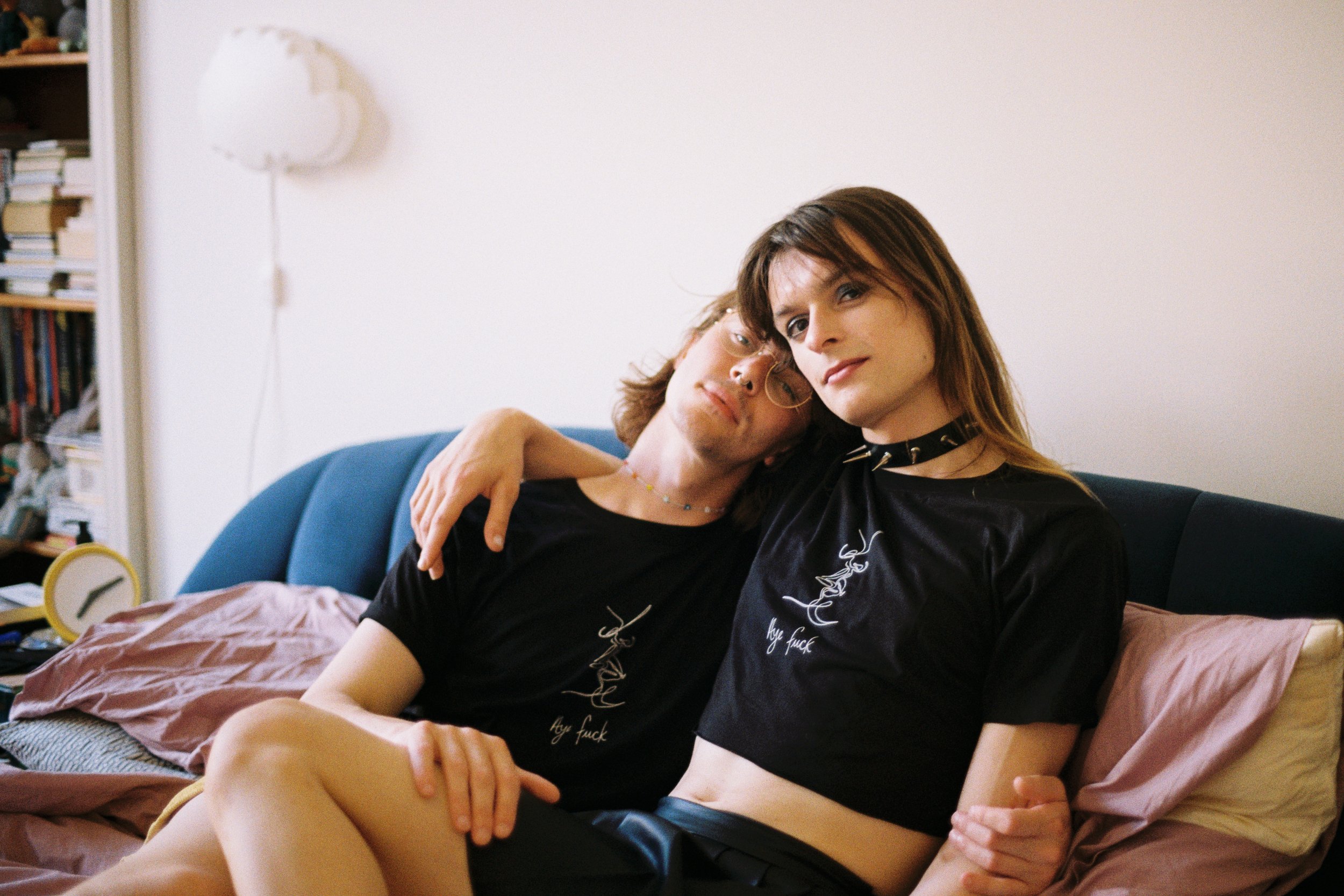
Callie and Barnie
Photography by Laura Prieto
Words By Becca Inglis
When Callie Rose Petal met Barnie Mumby-Price at a New Year’s Eve flat party, neither expected to find so much in common with the other.
First of all, both are artists – Callie is a musician who performs as lonely carp, while Barnie makes illustrations, prints and sculptures under the moniker GOMEDA.
Both have experienced gender dysphoria – Callie as a trans woman, while Barnie came out a year ago as non-binary.
And both have worked as sex workers, though there their experiences differ. Callie, like many trans sex workers, entered the industry as a last resort when her support network was suddenly cut off. Barnie, on the other hand, opted to become a sex worker as a route to taking control of their own working conditions.
Among these commonalities and differences, a bond between the pair was forged. Now friends and partners (and hopefully future creative collaborators), we catch up with them about how sex work, transness and creativity have intersected for them.
Can you each share your journey into sex work?
Callie: My journey into sex work is epitomised in my debut album Katabasis, which came out in November last year. I had to do survival sex. It wasn't a liberating or freeing experience for me at all. It was a very traumatic experience. I was going to lose my house and be homeless if I didn't make some money immediately, because I'd just come out to my family as trans and lost support from them during the pandemic. It was like seeing the underside of the world that I'd already known. I knew that these things existed, and I'd seen them in very covert ways in society through microaggressions directed towards me. But this was such an overt expression of all these things that I'd learned and been told about by the media. It was very arresting, very sobering, very horrible. A lot of these clients, each one of them fetishises. It was strange to be interacting so closely and so intimately with these people, and having to be coy and nice and polite, as they literally reeled off slurs. I remember feeling like I was dancing with death in a weird way. It was like every single time I didn't know what was going to happen, what this client was going to do to me, if it was going to be safe or not.
Barnie: I started sex work last year. I hated my job. I hated earning so little. I was really frustrated. We've got a number of friends who are sex workers, and I spoke to a couple of them and it sounded like they were all quite happy doing it. They got a lot out of it, a lot of autonomy, and felt like their time was valued in a way that I envied just working for minimum wage in retail. But I immediately found the landscape just dry for an AMAB quite male-presenting person. I felt quite a lot of pressure to present more femme, or to present more trans just for the sake of clients booking me. It took weeks to see my first client. When I did I was super nervous, because I'm meeting a stranger on their terms in their house doing an outcall. But when I left with some money in my pocket, I felt really positive about it, because I felt like my time was valued monetarily, more than it ever had been. I felt so much more respect for myself than I ever had just working for minimum wage. But then it completely dried up, and I haven't seen another client since, which was super frustrating.
It's quite common for trans and non-binary people to try sex work. Do you have any insight into why that might be?
Barnie: I think that we both came to it from places of struggling. I was struggling with not hating every waking moment doing a normal job. Callie was struggling financially. It almost feels like this is at least something where my gender is seen as useful or desired in its immediacy.
Callie: The only kind of representation that we're afforded right now is in porn, so that engenders fetishization. Then fetishization engenders not just the rest of society seeing us as sex objects, but also ourselves.
Barnie: It's one of the few places that you can immediately cash in the trans card for monetary gain.
Callie: What else are you going to do? That's the narrative that is in one's own head when one is in such a bad place.
What role can community play in supporting trans and non binary sex workers?
Barnie: It was so instrumental for me to even begin thinking about it, just having other friends who are also sex workers. Some of the coolest, most compassionate people I know helped me to see sex work in a different light. It was helpful to have other people to talk to who will see that as valid and not think differently about you for it. Obviously sex work is stymied, because people are prudes and don't see it as real work. I think having other queer friends that can relate to you just helps you feel less alone.
Callie: If I'd have had that, it wouldn't have been a such a fucking traumatic experience. If I'd have had a community of other trans sex workers around me during this time, I wouldn't have felt so alone. That goes for everything. It's not just sex work. It's fucking everything.
Callie, how did your experience with sex work inspire your last album Katabasis?
Callie: It's an allegorical descent to the underworld to express my experience with survival sex, and it progresses through seven movements. Each track is associated with a chakra of the human body. The big point that I'm making in the work is that the human body is Hell itself. The physical world is Hell, and the only way through it is to truly feel it in a real “we're going on a bear hunt” kind of situation. We have to go through it.
You draw from Greek mythology in the album. Were there any myths in particular that you referenced?
Callie: The Odyssey, Persephone - there's so many. I use the myth of Icarus to talk about my experience as a trans woman going into survival sex. Trying desperately to fly close to the sun, and the sun literally just being fucking groceries and a roof over your head, but falling back into the labyrinth of human experience.
The artwork is a depiction of Arachniad's transformation. Arachne is a myth where she had loads of hubris. She was a weaver. Then one of the goddesses, Minerva, challenged her to a competition to weave a tapestry. She did it so well that the goddess got really angry at her and turned her into a spider. I found that to be very Icarus-esque. If you think too much of yourself, if you try too hard, if you try to be too much of your own person, then you will be struck down and you will be punished for it, which is what it feels like as a trans person in today's society.
Do you think that trans and non binary workers are visible enough in the ongoing conversation about sex worker rights?
Barnie: No. I think the conversation around sex worker rights is almost exclusively about cis women. It's almost exclusively about how they're all exploited, and none of it is by choice. I think that there's lots of lots of cis women that choose to do it that are left out of the conversation. The conversation that happens about it is exceptionally limited, unfortunately. I think there's very little thought by lawmakers and pearl clutchers put into people that choose to do it, into men that do it, and trans women that do it.
Callie: Because the demure helpless damsel in distress is exactly what the patriarchy wants for a woman. That's the only option.
What changes do you want to see to the law, and society’s attitudes, to safeguard trans and non-binary sex workers?
Barnie: Allowing people to do it safely. There are rules around brothel keeping in Scotland that make it so that girls can't live in a house and do sex work together, so you have to do it on your own. I think that that makes it a lot more difficult to safeguard.
Callie: It's just like with the war on drugs, right? You can't regulate drugs if they're illegal. You can't research their medicinal properties if they're illegal. It’s the same thing with sex work. We need a political structural change to happen that can make sex work more of a safe thing.
















